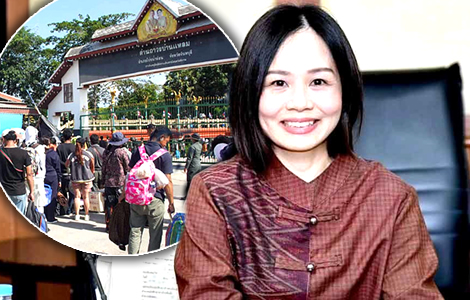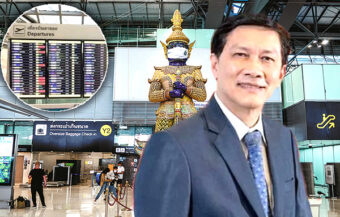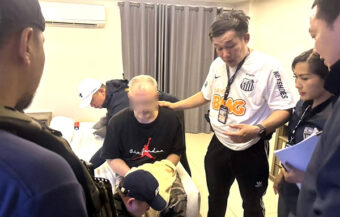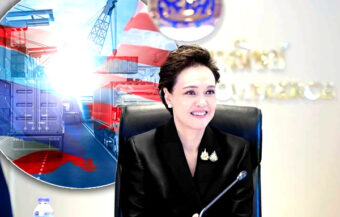Top Thai economist warns government plan to import Sri Lankan labour cannot replace hundreds of thousands of fleeing Cambodians as border tensions spark shortages, halt projects and threaten construction, farming and fishing sectors nationwide.
A top Thai economist is sounding the alarm over government plans to import Sri Lankan labour to replace hundreds of thousands of Cambodians who’ve fled amid rising border tensions. Dr. Kiriya Kulkolkarn, Associate Professor at Thammasat University, is urging immediate action to support Cambodian migrants risking everything to return. She’s also calling for a bold push to get Thai workers into roles once filled by Cambodians — but at better pay and with real protections.

A top Thai economist is warning that the government’s labour replacement plan may deepen the country’s economic instability.
Dr. Kiriya Kulkolkarn, Associate Professor at Thammasat University’s Faculty of Economics, has voiced strong opposition to replacing Cambodian workers with Sri Lankans. According to her, the current exodus of Cambodian labourers is already triggering serious disruptions across multiple sectors.
The Thai-Cambodian border crisis, worsening by the day, is hitting the Thai economy in critical areas. Although full damage estimates remain unclear, it has impacted already declining confidence in the economy. The sharpest blow, however, has come from the sudden withdrawal of Cambodian migrant workers.
Thousands of Cambodian workers flee vital jobs as Thai economy suffers and government remains silent
Due to mounting pressure from Phnom Penh and escalating fears at the border, hundreds of thousands of Cambodians are returning home. Many are leaving behind jobs in construction, fishing and agriculture — roles Thai employers say are nearly impossible to fill quickly.
Importantly, NGOs estimate that between 300,000 and 400,000 Cambodians — up to 90% of the legally registered total — have already left. Yet, despite this alarming figure, the government has released no official numbers. Instead, it has focused its response on national security concerns.
Dr. Kiriya insists this is a fundamental mistake. She argues that economic and security issues must be handled in parallel. “Security should not override economics,” she said. “But neither should economic concerns disregard legitimate security needs. Both require immediate, coordinated attention.”
In the absence of transparent data, businesses are already suffering. Many construction projects have halted due to the lack of manual labour. Contractors are missing delivery deadlines. Fishing boats are sitting idle due to a lack of crews. In the Eastern provinces, fruit farms are struggling to find enough workers to harvest crops.
Cabinet plan to ease labour crisis unlikely to help struggling sectors or stop project shutdowns
“Without action, these effects will worsen,” Dr. Kiriya warned. “We risk long-term harm to economic growth, investor confidence and food supply chains.”
To make matters worse, the government’s proposed solution may fall flat. On August 24, the Cabinet approved two measures to address the labour shortage. First, undocumented workers in Thailand can stay temporarily. Second, the government will begin importing workers from Sri Lanka under a Memorandum of Understanding (MOU).
However, Dr. Kiriya is deeply sceptical. “These plans don’t meet real needs on the ground,” she said. “They’re not practical or timely.”
She points out that most undocumented migrants already have jobs. As a result, they have little reason to enter the formal system voluntarily. “Offering legal status won’t suddenly free up workers who are already employed,” she added.
Sri Lankan workers seen as a poor fit for construction, fishing and agricultural jobs. More suited to services
Furthermore, importing labour from Sri Lanka brings its own set of problems. “Sri Lankans are generally skilled in service-sector jobs,” Dr. Kiriya said. “But Thailand’s labour shortage lies in construction, fishing and fruit picking.”
According to her, employers were not properly consulted. A separate informal survey showed that most businesses oppose the move. “Many employers don’t believe Sri Lankan workers can adapt quickly to these roles,” she said.
Additionally, integrating a new foreign workforce takes time. Workers need to understand Thai laws, language and workplace norms. Likewise, Thai employers and communities must be ready to receive them. “We don’t have that luxury of time,” Dr. Kiriya said. “The crisis is now.”
Instead, she urged the Ministry of Labour and the Immigration Bureau to act immediately. Their first step, she said, should be conducting an urgent nationwide survey. Authorities must determine how many Cambodian workers have left and what sectors are most affected.
“This data must be published publicly,” she insisted. “Only with accurate numbers can we design the right response.”
Thai workers willing to fill labour gaps if pay is raised and conditions improved, economic expert argues
Moreover, she argued that Thailand should focus on attracting Thai workers to fill critical labour gaps — at least temporarily.
She cited a successful initiative in Chanthaburi province, where longan farms have hired more than 30,000 Thai workers. These workers receive daily wages between ฿700 and ฿1,300, with free housing and nine-month contracts.
“Workers there are earning over ฿20,000 to ฿40,000 per month,” she said. “This proves Thai workers will do these jobs if the terms are fair.”
Therefore, Dr. Kiriya recommends a co-investment model. The government should work with businesses to share the cost of wages, benefits and worker welfare.
Another urgent step involves managing the return of Cambodian workers. Many who fled are trying to re-enter Thailand illegally due to poor job prospects at home. “Allowing illegal entry only creates more instability,” she said. “We must bring them back legally and register them properly.”
Unregulated re-entry of Cambodian migrants risks greater instability and undermines long-term solutions
Although tensions with Cambodia remain high, she believes the current approach is misguided. “When these workers re-enter the system, they become visible, regulated and safer for everyone,” she explained.
In the long run, many Cambodians will likely return voluntarily once the border crisis cools. But unless Thailand takes swift action now, industries could face permanent setbacks.
Cambodians and scammers risk all to get back into Thailand across a closed and dangerous border
DSI cops zero in on senior political official at the Ministry of Labour linked with migrant worker fees
Dr. Kiriya concluded with a sharp warning: “The wrong solution will cost us more than this crisis ever will. Poor planning, denial and delay could inflict lasting economic damage.”
In the absence of clear data, strong coordination and realistic solutions, Thailand’s labour force dilemma could soon evolve into a national crisis.
Join the Thai News forum, follow Thai Examiner on Facebook here
Receive all our stories as they come out on Telegram here
Follow Thai Examiner here
Further reading:
Cambodians and scammers risk all to get back into Thailand across a closed and dangerous border
Tensions are still rising on Thai Cambodian border as 2nd Army commander reveals defensive tactics
Charged situation – Defence chiefs from Thailand and Cambodia meet in Kuala Lumpur. ASEAN damaged
Fear on Eastern border under Martial law. Cambodian Bond nabbed on ฿162 a day from Phnom Penh regime


















